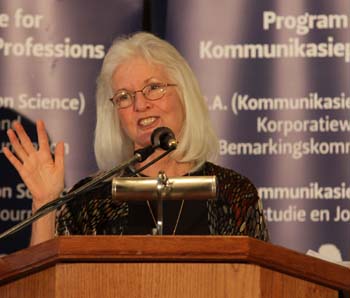Prof Mary Kay Blakely from the Missouri School of Journalism (USA) speaks about the age of misinformation

Prof Mary Kay Blakely |
Living in an age where misinformation is as common as loadshedding in South Africa, we all tend to ask who we can trust when reading or hearing the news media.
Prof Mary Kay Blakely from the Missouri School of Journalism (Columbia, USA) presented a public lecture recently entitled The age of misinformation: Who do you trust? at the UFS. She stressed the point of how, with the social media revolution and the rise of the citizen journalist, our news interests of old are being fed by many more new channels, influences, and opinions. This leaves us to question what is still true and what is still objective
For example, Blakely mentioned that “gossip, scandal, and celebrities have always been our fascination – even more so today.”
“But nowadays, we have to become even more critical thinkers.”
During Blakely’s presentation, she stated the harsh reality that objectivity is extremely difficult. True objectivity, which means keeping yourself completely out of the story you cover, is virtually impossible.
“It is not just about covering both sides of the story. Often, there are far more sides to a story than just two, probably even five.”
Therefore, it comes down to fairness, balance, and truth, which are really important in covering a story. Hence, it is the obligation of the media to be fair, balanced, and truthful while recognising their own biases.
Prof Mary Kay Blakely – Short Bio:
Prof Mary Kay Blakely is the author of the critically-acclaimed books Wake Me When It's Over, American Mom and Red, White and O So Blue. Her essays on social and political issues have appeared in The New York Times, The Washington Post, Mother Jones, LIFE, and Vogue, among others.